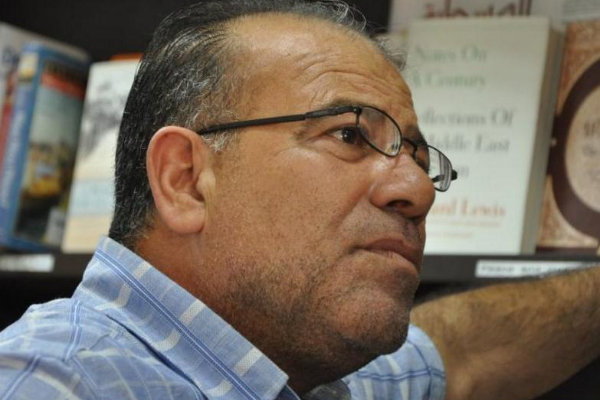CAMERA hosted Bassem Eid, a veteran Palestinian Arab human rights activist, for a Capitol Hill briefing on June 14, 2016 attended by more than 80 congressional staff members and interns, as well as representatives of other organizations. Eid, the founder and director of the former Palestinian Human Rights Monitoring Group, a non-profit organization based in the West Bank (Judea and Samaria), offered his views on the Arab-Israeli conflict in a Longworth House office building talk that was facilitated by the office of U.S. Rep. Doug Lamborn (R-CO).
In his remarks, Eid called for greater economic cooperation between Israel, the Kingdom of Jordan and the Palestinian Authority (PA) that controls the West Bank. Eid said that economic zones and agreements between the three parties would help “the average every-day Palestinian.” He suggested that a similar economic zone between Israel, Egypt and Palestinian Arabs living in the Hamas-ruled Gaza Strip also could be beneficial.
However, Eid acknowledged that Hamas, a U.S.-designated terrorist group that calls for the destruction of Israel and the genocide of Jews, would never work with the Jewish state and did not prioritize the well-being of the people living under its oppressive rule.
Eid said that most Palestinian Arabs are “seeking dignity, not identity.” Their identity, he asserted, they have. What they lack, the human rights activist elaborated, is leadership that can or wants to build opportunities for jobs, education and health care for themselves and their loved ones. This concern for their individual and family welfare trumps any current attention on diplomacy about a Palestinian state.
Eid noted that the PA has received “billions in aid” from the international community, including the United States, but despite this, the authority has “failed to create jobs for Palestinians.” He called corruption among Palestinian leadership “big and wide.”
Additionally, Eid pointed out that if a Palestinian state were to come into being, the current state of Palestinian politics in the Gaza Strip and West Bank would suggest that such a state would be repressive and undemocratic. Moreover, since the West Bank falls under the control of the PA, dominated by the Fatah movement, and the Gaza Strip is ruled by its rival Hamas, Eid rhetorically asked, “Which Palestinian state are you going to recognize? And what kind of state would it be? Not a state I want or dream of.”
Eid noted that human rights abuses of Palestinian Arabs by Palestinian leaders receive little attention from the “international community”—a fact CAMERA has pointed out (see, for example “Where’s the Coverage? Palestinian Official Admits ‘Torture Happens,’” March 28, 2016).
For the reasons noted above, Eid suggested that Palestinians need an “immediate change in our political life.” He warned that with the current Palestinian leadership, there will not be peace.
Eid said that “only the Palestinian leadership has benefitted” from the so-called “stabbing intifada,” in which Palestinian Arabs have, since September 2015, have attacked—and in some cases murdered—Israelis with rocks, cars, knives and guns. This violence, he told the audience, focuses on Palestinian issues but not understanding of internal Palestinian division. As a result, in reality it is “only proving the lack of [Palestinian] leadership.”
Eid discussed a recent effort by the French government to increase pressure on Israel for concessions to the Palestinian Authority. The human rights advocate said that peace between Israel and Palestinian Arabs could only be achieved through bilateral negotiations. He noted that the French attempt was an example of the “international community becoming part of the conflict, instead of part of the solution.” What was the point, he asked, of fathering the U.S. secretary of state and 25 other foreign ministers in Paris just to call for a resumption of direct negotiations, which Israel already has endorsed but Palestinian leaders refused?
The focus by the international community on the Arab-Israeli conflict is odd, Eid said. With bloody civil wars raging in Syria and Yemen, political instability and killings in Iraq and Libya, and Lebanon functioning as a vassal state for Hezbollah, a U.S.-designated terrorist group, Israel offers a marked contrast. Eid pointed out that “as a Muslim, as an Arab,” he is safer in the Israeli-Palestinian conflict than anywhere else in the Middle East.
After his talk ended, a member of the audience approached Bassem Eid and CAMERA staff. She noted that it was rare on Capitol Hill to hear a Palestinian Arab offering the viewpoints that Eid presented.
http://www.camera.org/index.asp?x_context=7&x_issue=16&x_article=3370









